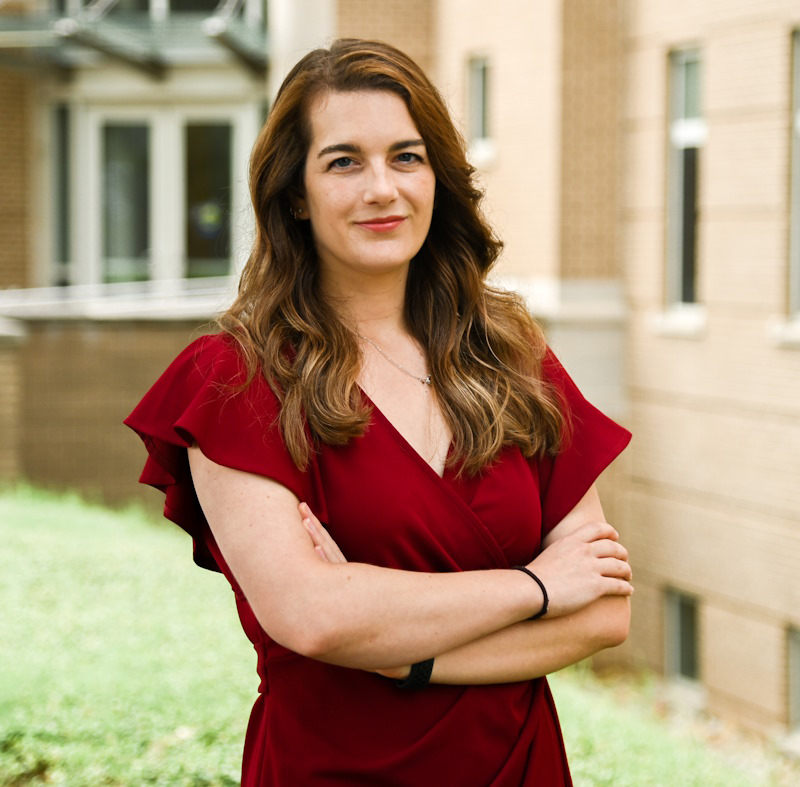August 19, 2024 | Erin Bluvas, bluvase@sc.edu
The Arnold School has been home to Kyndall Dye-Braumuller for the past five years, and she’s agreed to extend her stay. The Ph.D. in Epidemiology graduate (’22) and postdoctoral fellow recently accepted a research assistant professor position with the Department of Epidemiology and Biostatistics.
“Over the past few years as a doctoral student and postdoctoral fellow here, I have been a part of some really wonderful projects where we have filled in gaps in our understanding of infectious disease risk for residents of South Carolina and abroad,” Dye-Braumuller says. “The Arnold School has always been supportive and inclusive when new ideas are brought into the fray, and I have grown to love this community.”
Dye-Braumuller’s research combines two different, yet applied, disciplines: epidemiology and entomology. She discovered the first when she was in middle school and watched the 1995 film, Outbreak. That’s when she knew that she wanted to become an infectious disease epidemiologist.
Then, during her undergraduate program studying environmental health science at the University of Georgia, she took an entomology course. Dye-Braumuller fell in love with the study of insects, but her passion for epidemiology remained strong as well.
“At an impasse for what I wanted to do with my life, I thought I created a 'new' career by combining entomology and epidemiology,” she says. “As it turns out, there is an entire field called medical entomology or public health entomology, which is the study of arthropod vectors and their impact on human health.”
Dye-Braumuller knew she had found her vocation – studying vectors (i.e., insects and
ticks that can transmit diseases between animals and humans) and their health impacts.
She added entomology to her studies and contributed to zoonotic diseases research while earning two bachelor’s degrees.

After completing a master’s in entomology at the University of Kentucky, Dye-Braumuller moved to Houston, Texas to gain experience as the vector surveillance manager for the local public health department. She crossed paths with a postdoctoral fellow at Texas Children’s Hospital, Melissa Nolan, and they connected over their shared interest in tick- and kissing bug-borne diseases. When Nolan took a position at the Arnold School, Dye-Braumuller enrolled in the Ph.D. program so they could collaborate.
Over the course of her doctoral studies (during which she received the school’s Doctoral Achievement Award) and a two-year postdoctoral fellowship, Dye-Braumuller has become an integral part of the Arnold School’s growing expertise in the field of zoonotic diseases, particularly vector-borne illnesses. Working with the South Carolina Department of Public Health (formerly DHEC), the team has expanded tick surveillance in the state – launching its first formal surveillance program, which Dye-Braumuller led as its inaugural coordinator. They’ve also collaborated extensively with the University of El Salvador and the country’s Ministry of Health.
Today, Dye-Braumuller’s research focuses on understanding various aspects of vector-borne disease transmission dynamics. She is particularly interested in vector-pathogen interactions, vector and pathogen genome change over time, human behavior and changes to vector-borne disease risk, and novel vector control strategies.
Dye-Braumuller is excited to be a part of the Institute for Infectious Disease Translational Research, which USC launched last year. She is also looking forward to continuing to work with students – both in the classroom and the lab.
“I thoroughly enjoy bringing in a somewhat new discipline to public health in the classroom, particularly entomology,” Dye-Braumuler says. “Infectious disease epidemiology will always be one of my favorite courses to teach, and I love to include as many references and hands-on activities to introduce students to medical/public health entomology as well.”
“We are so excited to have Dr. Dye-Braumuller join the faculty of the Department of Epidemiology and Biostatistics,” says chair Anthony Alberg. “Dr. Dye-Braumuller has proven herself to be an exceptional researcher whose cross-disciplinary training adds a critical dimension to the study of vector-borne diseases, an issue of increasing public health importance.”
